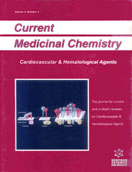Abstract
In vitro experiments and in vivo studies indicate that estrogens exert various beneficial effects on the vascular wall. In the present review the recent literature and the results of our own studies on this topic are summarized. By modulating the synthesis of nitric oxide, prostacyclin and endothelin and blocking calcium channels estrogens positively affect the vasotonus. Atherogenesis, which is considered an inflammatory, fibroproliferative process, may be delayed by estrogens via downregulation of inflammatory markers, such as cell adhesion molecules and chemokines. The delay is further supported by the inhibition of smooth muscle cell proliferation and downregulation of angiotensin receptor gene expression as well as by its antioxidative property. In addition, estrogens may stabilize the atherosclerotic plaque by reducing the expression of matrix metalloproteinases. The thrombogenic potency of the ruptured plaque may be reduced also by estrogens via downregulating the synthesis of plasminogen activator inhibitor-1. In addition, own clinical studies suggest that other non-endothelial derived vasoactive surrogate markers, such as serotonin and urodilatin, may be positively influenced by estrogens. Differential effects of progestin addition were observed concerning the direct estrogenic effects on the vasculature. Antagonistic progestin effects have been observed for some markers and may depend on the type of progestin and on its administration mode. Thus, the role of progestin addition remains to be elucidated in further studies.
Keywords: estrogens, direct vascular actions
 10
10













